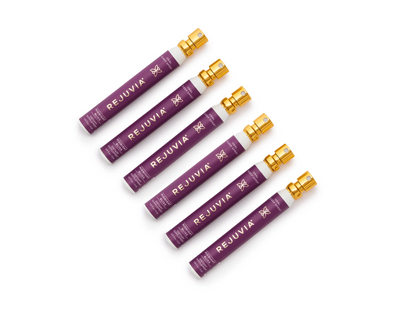Stress is one of the biggest culprits behind poor sleep. It disrupts your body’s natural rhythms, keeps your mind racing, and prevents you from getting the rest you need. Here’s how stress impacts your sleep and what you can do to fix it:
- Disrupts Sleep Patterns: Stress hormones like cortisol alter your sleep stages, reducing deep and REM sleep.
- Delays Falling Asleep: Racing thoughts and an overactive nervous system make it harder to relax.
- Causes Night Wakings: Stress keeps you in lighter sleep stages, leading to frequent awakenings.
- Leads to Bad Habits: Coping mechanisms like late-night screen use worsen sleep problems.
- Creates a Vicious Cycle: Poor sleep increases stress, which further disrupts rest.
Quick Fixes:
- Try deep breathing or progressive muscle relaxation before bed.
- Set a "technology curfew" to limit screen time at night.
- Use natural aids like Rejuvia Sleep Spray for extra support.
Stress doesn’t have to control your sleep. By addressing these issues head-on with practical strategies, you can break the cycle and wake up feeling refreshed.
How Do Stress Triggers Ruin Your Sleep? - Get Rid Of Guide
1. Stress Breaks Down Your Natural Sleep Patterns
Your body has a built-in sleep system known as sleep architecture. This is a carefully balanced cycle that moves through light sleep, deep sleep, and REM (Rapid Eye Movement) sleep multiple times each night. However, stress can throw this entire system off track, disrupting your ability to achieve the restorative rest your body craves. When stress takes over, it alters the way you progress through these stages, leading to noticeable changes in your sleep quality.
How Stress Hormones Disrupt Sleep
The hormone cortisol, often referred to as the "stress hormone", plays a key role in your body’s sleep-wake cycle. Under normal conditions, cortisol levels peak in the morning to help you wake up and gradually decline throughout the day, reaching their lowest point at bedtime. But when stress becomes chronic, this rhythm is flipped. Elevated cortisol levels at night interfere with melatonin production, the hormone that signals your brain it’s time to sleep. This can leave you feeling physically drained but mentally alert, making it difficult to relax into the deeper stages of sleep.
Other stress hormones like adrenaline and noradrenaline also come into play. These hormones increase your heart rate, blood pressure, and body temperature - conditions that are far from ideal for restful sleep. Even if you manage to fall asleep, these elevated stress hormones can keep your sleep light and fragmented, preventing you from reaching the restorative phases your body needs.
Stress particularly impacts deep sleep, which typically makes up 15-20% of your total sleep time. This stage is critical for physical recovery, and under stress, its duration is significantly reduced. Similarly, REM sleep, essential for emotional processing and memory consolidation, becomes shorter and more fragmented. The result? You wake up feeling mentally foggy and emotionally off-balance.
Normal Sleep vs. Stress-Affected Sleep
Here’s a closer look at how stress reshapes your sleep patterns:
| Sleep Aspect | Normal Sleep Pattern | Stress-Affected Sleep Pattern |
|---|---|---|
| Sleep Onset | Fall asleep within 10-20 minutes | Takes over 30 minutes to fall asleep |
| Deep Sleep Duration | 15-20% of total sleep time | Drops to 10-15% or less |
| REM Sleep | 20-25% of sleep, occurs in longer periods | Shortened and fragmented |
| Night Awakenings | 1-2 brief awakenings | 3-5 or more awakenings |
| Morning Feeling | Wake up refreshed and energized | Wake up groggy and unrefreshed |
| Sleep Efficiency | 85-95% of time in bed spent sleeping | Drops to 70-80% efficiency |
The reduction in REM sleep is particularly concerning. REM is vital for processing emotions and organizing memories from the day. Without enough of it, you may struggle with emotional regulation and concentration. This can leave you feeling irritable, anxious, or overwhelmed, creating a vicious cycle where stress disrupts your sleep, and poor sleep makes managing stress even harder.
Even if you spend a full eight hours in bed, stress can rob you of quality rest. You might end up with the equivalent of only five or six hours of truly restorative sleep. Over time, this "sleep debt" builds up, leaving you perpetually fatigued and more susceptible to stress during your waking hours.
2. Stress Makes It Hard to Fall Asleep and Stay Asleep
Stress doesn’t take a break just because you’re ready to sleep. Instead, it turns bedtime into a mental tug-of-war between your body’s need for rest and your mind’s refusal to let go of the day’s worries. This often leads to two common problems: sleep onset insomnia (trouble falling asleep) and sleep maintenance insomnia (difficulty staying asleep). Both issues arise because stress keeps your brain stuck in overdrive, unable to shift into the calm state needed for restful sleep.
Falling asleep requires your nervous system to gradually slow down, a process that usually takes 10 to 20 minutes. But when stress is in the mix, your sympathetic nervous system - the part of your body that handles "fight or flight" responses - stays active. Instead of winding down, your body remains on high alert, ready to tackle threats like deadlines, arguments, or financial concerns. This heightened state of awareness fuels racing thoughts, which often sabotage your ability to sleep.
Racing Thoughts at Bedtime
One of the main ways stress disrupts sleep is through mental hyperarousal - a state where your mind refuses to quiet down. As soon as you lie down, unresolved problems, tomorrow’s to-do list, and worst-case scenarios can flood your thoughts. This "bedtime anxiety" can stretch what should be a peaceful transition into hours of restless wakefulness.
At night, your brain processes stress differently. Without the distractions of daytime activities, worries can feel louder and more urgent. This happens because your prefrontal cortex - the part of your brain responsible for rational thinking - becomes less active as you approach bedtime. Meanwhile, your amygdala, the brain’s alarm system, stays on high alert, amplifying stress signals. The result? A cycle of rumination, anticipatory anxiety, and catastrophic thinking that keeps you awake.
This mental activity triggers stress hormones, which further delay sleep. Ironically, the harder you try to stop worrying, the more active your mind becomes, creating a frustrating loop that’s hard to break.
Signs of Stress-Related Sleep Problems
Recognizing the signs of stress-induced sleep issues is the first step toward addressing them. For example, sleep onset problems often involve lying awake for more than 30 minutes despite feeling physically exhausted. You might find yourself repeatedly checking the clock, calculating how much sleep you’ll get if you fall asleep "right now" - a habit that only adds to your anxiety.
Another common sign is frequent night wakings. While brief awakenings during the night are normal, stress can cause you to wake up three, four, or even five times, often with your mind racing as soon as you’re conscious. These disruptions usually occur during lighter sleep stages, and falling back asleep becomes difficult because your stress response kicks in immediately.
Early morning awakenings - waking up between 3:00 AM and 5:00 AM with your mind buzzing - are also typical of stress-related sleep issues. Even if your body craves more rest, stress can exaggerate natural cortisol fluctuations, making it nearly impossible to drift back to sleep.
Physical symptoms often go hand in hand with these sleep disturbances. You might notice your heart racing, feel muscle tension in your shoulders or jaw, or experience restless legs. Other signs include night sweats, feeling too hot or cold, or general discomfort that prevents relaxation.
Even if you manage to stay in bed for seven or eight hours, the quality of your sleep may suffer. Stress often robs you of the deeper, restorative stages of sleep, leaving you feeling unrefreshed, mentally foggy, or emotionally fragile when you wake up.
The effects of stress-related sleep problems don’t end in the morning. Throughout the day, you might struggle with poor concentration, irritability, or emotional sensitivity. Physical fatigue can feel overwhelming, even if your activity level doesn’t seem to warrant it. These daytime challenges create a vicious cycle, making it even harder to achieve the restful sleep your body and mind desperately need.
3. Stress Causes Tossing and Turning All Night
Stress doesn’t clock out when you fall asleep. Instead, it continues to interfere with your rest, turning what should be a time of recovery into fragmented and shallow sleep. This disruption ties back to earlier changes in your sleep patterns, carrying stress's effects well into the night.
When stress keeps your nervous system on high alert, even during sleep, you become more sensitive to minor disturbances. A car door slamming outside or your partner shifting in bed might jolt you awake, as your body remains primed to react.
The physical toll of nighttime stress is easy to spot. You might find yourself constantly shifting positions, waking up with a clenched jaw or tense shoulders. Your body's temperature regulation can also go haywire, leading to fluctuations that make staying comfortable a challenge.
How High Cortisol Levels Keep You Restless
Stress doesn’t just mess with how you fall asleep - it also impacts the quality of your sleep throughout the night. Cortisol, the hormone your body releases in response to stress, is supposed to drop by bedtime. But when stress is chronic, cortisol levels stay elevated, wreaking havoc on your ability to rest.
High cortisol levels can raise your core body temperature and keep you stuck in lighter stages of sleep, making it easier for small noises or movements to wake you up. This fragmented sleep prevents you from experiencing the deep, restorative cycles your body needs.
Timing matters, too. Cortisol spikes often align with natural awakenings that occur every 90 to 120 minutes during normal sleep. Instead of drifting smoothly back to sleep, these spikes can leave you wide awake, your mind racing in the middle of the night.
Other stress hormones, like adrenaline and norepinephrine, further complicate things. They can increase your heart rate and blood pressure while you sleep, leading to frequent micro-awakenings that you might not even remember but that disrupt your overall rest.
Good Sleep vs. Broken Sleep
Recognizing the difference between restorative sleep and the kind of broken sleep caused by stress can help you identify when stress is interfering with your nights.
| Aspect | Good Sleep | Broken Sleep |
|---|---|---|
| Sleep Onset | Fall asleep within 15–20 minutes | Struggle to fall asleep, taking much longer |
| Night Wakings | 1–2 brief awakenings, easy to fall back asleep | 3–6+ awakenings, each lasting 10+ minutes |
| Sleep Depth | Progression through all sleep stages | Mostly light sleep, minimal deep sleep |
| Body Position | Stay comfortable in one position for hours | Constantly shifting positions |
| Temperature | Stable throughout the night | Fluctuates between hot and cold, with sweats |
| Morning Feeling | Wake up refreshed and alert | Wake up groggy and unrefreshed |
| Sleep Efficiency | 85% or more of time in bed spent sleeping | 70% or less, with significant time awake |
| Dreams | Consistent, vivid dreams | Fragmented or barely recalled dreams |
Broken sleep doesn’t just leave you tired - it can show up in other ways, too. Puffy eyes, dark circles, and a dull complexion may hint at poor circulation during the night. Your ability to think clearly and make decisions can also take a hit after a restless night.
One of the clearest indicators of sleep quality is sleep efficiency - the percentage of time spent asleep while in bed. Healthy sleepers typically achieve 85% to 95% efficiency, while those dealing with stress often drop to 70% or lower. This means spending hours awake even when you’re trying to rest.
The long-term effects of fragmented sleep can lead to what researchers call sleep debt - a deficit that can’t be erased with just one night of good sleep. Over time, this partial sleep deprivation can leave you feeling drained, even after what seemed like a full night in bed.
Breaking this cycle requires addressing both the stress itself and the symptoms it triggers, which we’ll dive into in the next sections.
sbb-itb-de8e20a
4. Stress Coping Habits Make Sleep Worse
Stress doesn't just mess with your hormones - it can also lead to habits that make sleep even harder to come by. While stress hormones like cortisol already disrupt sleep, the ways we try to cope with stress often add fuel to the fire. Many of the routines we rely on to unwind after a tough day can actually interfere with our ability to relax and fall asleep.
One of the most common culprits? Screens. Whether it's scrolling through social media, binge-watching a show, or catching up on emails, these activities can work against your body's natural sleep signals - especially when they happen right before bed.
How Phone Use Before Bed Hurts Sleep
Smartphones and other devices emit blue light, which can suppress melatonin, the hormone that helps regulate sleep. On top of that, engaging with stimulating content - like a heated group chat or an intense video game - keeps your mind active when it should be winding down. This combination of light exposure and mental stimulation can make it much harder to fall asleep.
On the flip side, calming activities like reading a book or practicing mindfulness before bed can help signal to your body that it's time to relax. Building a consistent bedtime routine with these kinds of activities can make a big difference in preparing your mind and body for rest.
The Cycle of Poor Sleep and More Stress
Lack of sleep and stress often go hand in hand, creating a frustrating loop. Poor sleep leaves you feeling more stressed and less equipped to handle challenges during the day. That extra stress can then lead to unhealthy coping habits, like late-night screen time, which further disrupt sleep. It's a cycle that's tough to break.
To get out of this loop, it's essential to address both the stress and the sleep issues at the same time. This might mean setting a "technology curfew" to limit screen use before bed or trying relaxation techniques like deep breathing or meditation. By creating a routine that prioritizes both relaxation and sleep, you can start to reclaim your nights and feel more in control of your days.
5. How to Beat Stress for Better Sleep
If stress is keeping you up at night, there are practical ways to reclaim your rest. You don’t need to rely on prescription medications to see quick improvements. By using simple, effective methods, you can calm your mind and body, paving the way for better sleep.
Relaxation and Mindfulness Methods
One of the simplest ways to ease stress before bed is through deep breathing exercises. A popular method is the 4-7-8 technique: inhale for 4 seconds, hold your breath for 7 seconds, and exhale slowly for 8 seconds. This pattern helps trigger your body’s relaxation response, lowering stress hormones like cortisol.
Another helpful tool is progressive muscle relaxation. This involves tensing and then releasing muscle groups one at a time, starting from your feet and moving up to your head. It’s a great way to release tension you might not even realize you're holding onto, helping your body fully relax.
For racing thoughts, mindfulness meditation can be a game-changer. You don’t need special equipment or hours of practice - just 10 minutes of focused breathing or body awareness can quiet your mind. Apps like Headspace or Calm offer guided sessions designed specifically for sleep, making it easy to get started.
Creating a consistent wind-down routine is just as important. About an hour before bed, dim the lights, put away your electronics, and engage in calming activities like journaling, gentle stretching, or reading. Over time, your brain will come to associate these activities with sleep, making it easier to drift off naturally.
Rejuvia Sleep Spray: A Natural Solution

If you’re looking for a natural sleep aid, Rejuvia Sleep Spray is worth considering. Unlike traditional sleep aids that may leave you groggy or lead to dependency, this oral spray works with your body’s natural sleep cycle using all-natural ingredients.
Its spray format ensures quick absorption, providing faster results. At $39 for 30 servings (around $1.30 per night), it’s both effective and budget-friendly. The mint flavor makes it pleasant to use, and you can adjust the dosage to fit your needs.
Rejuvia Sleep Spray is non-habit forming, so you won’t have to worry about tolerance or withdrawal. Plus, its ingredients are rigorously tested for purity and potency, ensuring consistent quality with every use.
Comparing Sleep Solutions
When tackling stress-related sleep issues, it helps to see how different approaches measure up:
| Method | Effectiveness | Ease of Use | Cost | Time to Results |
|---|---|---|---|---|
| Deep Breathing | High for mild stress | Very Easy | Free | 5-10 minutes |
| Progressive Muscle Relaxation | High for physical tension | Moderate | Free | 15-20 minutes |
| Mindfulness Meditation | High for racing thoughts | Moderate | Free-$15/month | 10-30 minutes |
| Rejuvia Sleep Spray | High for multiple sleep issues | Very Easy | $39/month | 15-30 minutes |
The best results often come from combining methods. For example, you could pair deep breathing with Rejuvia Sleep Spray or mix mindfulness meditation with progressive muscle relaxation. Experiment to find a routine that feels right for you.
Consistency is key. Even practicing these techniques a few times a week can make a noticeable difference in your stress levels and sleep quality. Start with one or two methods that resonate with you, and gradually add more as they become part of your nightly routine.
Conclusion: Take Control of Stress for Better Sleep
Stress doesn't have to dictate how you sleep. While it can disrupt falling asleep, staying asleep, and the overall quality of your rest, there are ways to break free from its hold.
Understanding how stress hormones interfere with your body's natural rhythm is the first step. Once you grasp this, you can take specific actions to restore balance and reclaim your nights.
Start with simple techniques like the 4-7-8 breathing exercise or progressive muscle relaxation. Even dedicating just 10 minutes to mindfulness can help quiet those racing thoughts and bring a sense of calm. These strategies are easy to try and could make a difference as soon as tonight.
For added support, you might explore natural options like Rejuvia Sleep Spray, which costs only $1.30 per night. It can be a helpful addition to your relaxation routine, complementing other stress-reducing practices.
Remember, consistency matters more than doing everything perfectly. Focus on one or two strategies that resonate with you - whether it’s deep breathing, establishing a calming bedtime ritual, or using a natural sleep aid. Over time, as these habits take root, you’ll likely notice not only improved sleep but also reduced stress throughout your day.
Investing in your sleep is investing in your well-being. By managing stress now, you’re setting the stage for restful nights and more energized, productive days. Take that first step tonight - you deserve it.
FAQs
How does stress affect sleep stages like REM and deep sleep?
Stress has a way of interfering with your sleep, particularly by cutting down on deep sleep (slow-wave sleep) and REM sleep - the stages that play a key role in helping your body and mind recover. It can also cause you to wake up more often throughout the night, throwing off your natural sleep cycles.
Sometimes, short-term stress might actually boost REM sleep temporarily as your body works to adjust and recover. But when stress becomes a long-term issue, it tends to activate brain pathways that cause brief wake-ups, known as microarousals. These interruptions can further chip away at the quality and length of the sleep you need to feel truly rested.
How can I calm racing thoughts to fall asleep more easily?
To ease a restless mind and drift off to sleep more smoothly, try incorporating mindfulness techniques into your routine, such as deep breathing, meditation, or guided imagery. These approaches are great for calming mental chatter and encouraging relaxation. Another helpful method is progressive muscle relaxation, where you tense and then release each muscle group to relieve physical tension and stress.
Establishing a steady bedtime routine that includes calming activities can cue your body that it’s time to unwind. Steer clear of stimulating habits, like scrolling through your phone or watching TV, right before bed. Over time, these practices can help lower stress levels and make it easier to fall asleep.
Does using electronic devices before bed affect sleep, and how can I reduce the impact?
Using electronic devices before bed can interfere with your sleep. The culprit? Blue light. It disrupts melatonin production, the hormone that helps regulate your sleep cycle. This can make it tougher to fall asleep and might even lower the quality of your rest.
To counter this, try switching off your devices at least 30–60 minutes before hitting the pillow. If you absolutely need to use them, enable night mode or use a blue light filter to reduce the impact. These small adjustments can go a long way in helping your body wind down and enjoy better sleep.
Related Blog Posts
- Why You Can't Sleep: 8 Common Causes
- Sleep Hygiene Checklist: 12 Must-Do Steps
- Does Vitamin D Help You Sleep Better?
- Sleep Cycle Breakdown: Light, Deep, and REM





